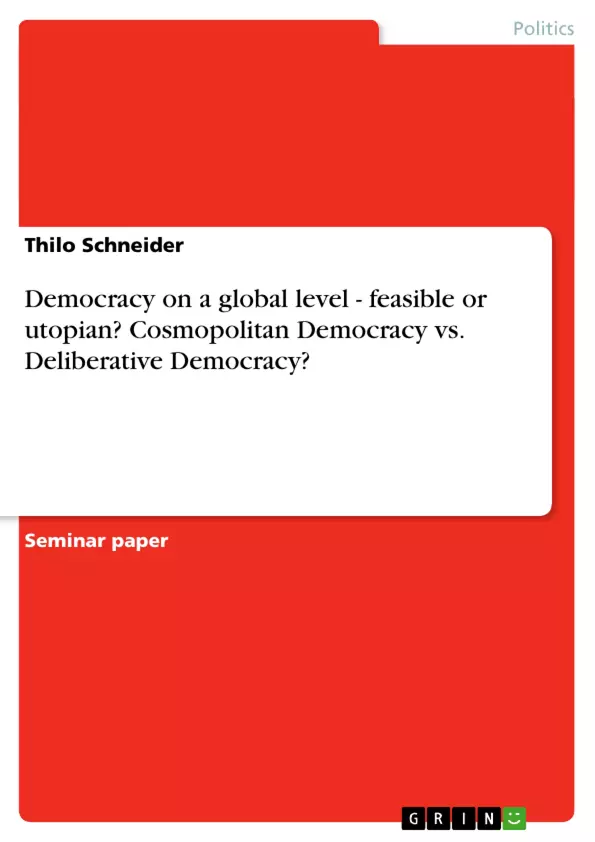In this written homework I will use the term “globalization” to “describe the growth and
spread in investment, trade, and production, the introduction of new technology, and the
spread of democracy around the world”. (ibid. 2003: 1). It has to be noticed that this economic
globalization “would affect not only production, finance, technology, media and fashion,
but also the international political system, leading also to a globalization of democracy“
(Archibugi 2004: 438) Here it is important to note, that on the one hand I support the claim
that the ideas of democracy are globalized, on the other hand , however, there has to be kept
in mind, the constraint that democracy is only global as a formal or structural blueprint. The
flexible characteristics and focuses of democracy differ in many ways; therefore it is not possible
to state that an all-embracing final democratic model exists.
According to Pauly the impact of globalization shortens national capacities so that they become
“inefficient regulators of markets that cross their borders, ..” (Pauly 2000: 4) This
raises questions about the democratic legitimacy of an increasingly internationally operating
government and international institutions with an indefinite and not clearly defined designation
of legitimacy caused by a weak democratic proportion on a global level.
Additionally one can observe a rapidly growing number of non-state actors and rising influence
like TNCs and NGOs. Approaches concerning the processing of these topics are described
under the wide field of “global governance”.The theoretical discussion and their discourse offer help to take a look on today’s institutionsand their problems, the role of the state and the possible implementation approaches of theoretical ideas towards a democratic form of global governance. One solution, obviously, would be a transfer of states´ sovereignty to a regional or global level.
I will concentrate on the confrontation of two basic models of democracy beyond the nationstate,
the Cosmopolitan Democracy and the Deliberative Democracy. Based on different normative
assumptions they have different ideas of how to create a more adequate form of governance.
I will present both concepts separately followed by an all-embracing valuation and a
conclusion.
Inhaltsverzeichnis (Table of Contents)
- Introduction
- Cosmopolitan Democracy
- Introduction
- The principle of autonomy
- Democratic public law
- Deliberative Democracy
- Deliberation
- Public Spheres
- Cosmopolitan Democracy vs. Deliberative Democracy?
- Mode of legitimacy - Input/output.
- Principle of differentiation – functional/sectoral
- Political Style - Horizontal/Hierarchical
- Final Comparison and Evaluation
Zielsetzung und Themenschwerpunkte (Objectives and Key Themes)
This written homework examines the feasibility of democracy on a global level, comparing and contrasting two prominent models: Cosmopolitan Democracy and Deliberative Democracy. It explores the challenges of achieving democratic governance in an increasingly interconnected world, where the impact of globalization and non-state actors raises questions about accountability, transparency, and legitimacy.
- The evolving role of democracy in the face of globalization
- The challenges of achieving democratic governance beyond the nation-state
- The theoretical framework and implementation of Cosmopolitan Democracy
- The theoretical framework and implementation of Deliberative Democracy
- A comparison of Cosmopolitan Democracy and Deliberative Democracy, considering their strengths and weaknesses
Zusammenfassung der Kapitel (Chapter Summaries)
- Introduction: The introduction establishes the context of the paper, highlighting the increasing complexity of international relations and the impact of globalization on democratic structures. It defines the term "globalization" and outlines the importance of exploring different models of democratic governance beyond the nation-state.
- Cosmopolitan Democracy: This chapter introduces the concept of Cosmopolitan Democracy as a framework for implementing democratic principles within, among, and beyond states. It emphasizes the concept of "reconfiguration of political power" and the declining influence of nation-states in the globalized world.
- The "principle of autonomy": This section focuses on the central principle of autonomy in Cosmopolitan Democracy, highlighting its connection to individual freedom and self-determination. It explains how the concept of autonomy goes beyond majority rule, embracing a liberal understanding of democracy that emphasizes individual will.
- Deliberative Democracy: This chapter introduces Deliberative Democracy, outlining its core principles and its focus on public deliberation as a means of achieving democratic outcomes. It examines the role of public spheres and the importance of dialogue and consensus-building in democratic processes.
Schlüsselwörter (Keywords)
The paper focuses on key terms like cosmopolitan democracy, deliberative democracy, global governance, globalization, accountability, transparency, legitimacy, autonomy, public spheres, and deliberation. It explores these concepts through a comparative analysis of the two prominent models of democracy in a globalized world, ultimately seeking to understand how democratic values can be effectively implemented on a transnational level.
Frequently Asked Questions
Is global democracy feasible or just a utopia?
The paper explores this by comparing Cosmopolitan and Deliberative models, highlighting that while a single model is unlikely, formal democratic structures are spreading globally.
What is Cosmopolitan Democracy?
It is a model that proposes democratic principles should be implemented across borders, involving global institutions and a reconfiguration of political power beyond the nation-state.
How does Deliberative Democracy work on a global level?
It focuses on public discourse and dialogue (deliberation) within global public spheres to achieve consensus and legitimacy for international decisions.
What are the main challenges of Global Governance?
Challenges include the lack of clear democratic legitimacy, the rising influence of non-state actors like NGOs and TNCs, and the diminishing sovereignty of nation-states.
What is the "principle of autonomy" in this context?
It refers to the right of individuals to self-determination and freedom, which Cosmopolitan Democracy seeks to protect through global legal frameworks.
- Citation du texte
- Thilo Schneider (Auteur), 2006, Democracy on a global level - feasible or utopian? Cosmopolitan Democracy vs. Deliberative Democracy?, Munich, GRIN Verlag, https://www.grin.com/document/68896



